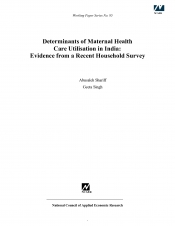Determinants of Maternal Health Care Utilisation in India: Evidence from a Recent Micro Household Data
February 2002
In India, utilisation of basic health services has remained poor. The reasons may be low levels of household income, high illiteracy and ignorance, and a host of traditional factors. In this paper, an attempt is made to discuss the issues associated with the demand and supply of the five measures of maternity care: antenatal care, blood pressure check up, place of delivery, use of trained help at the time of delivery and postnatal care. Econometric analysis is undertaken to find out the determinants of the use of reproductive health care services among rural Indian households. Rural data from 32,000 households belonging to 1765 villages across all parts of India was collected by the NCAER in 1994. The multi-model survey was conducted both at the national and state level. The analysis pertains to 7635 women in the reproductive age group who delivered a child in the year before the survey. The focus on the role of education, information and economic factors as determinants of health care accessibility and their utilisation is the speciality of this analysis. Analysis shows that education and information variables significantly increase the utilisation rates for prenatal, child delivery and postnatal health care. Women with primary education are more likely to use maternal health services as compared to illiterate women, even after controlling for income and health care supply factors. Exposure to media increases the probability of reproductive health care utilisation. Economic factors such as wages and income are important only for the utilisation of child delivery services. Access to locally available health services significantly increases maternity care use. An important health care facility in this respect has been the village level ICDS centre. Further, probit regression analysis is used to examine the impact of individual, household and community level variables on the above choices of reproductive health care.
Human Development and Data Innovation







